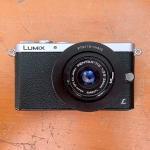-
Posts
3,169 -
Joined
-
Last visited
Reputation Activity
-
 fuzzynormal got a reaction from CTRT in So I read that RX10 ii review, and... help!
fuzzynormal got a reaction from CTRT in So I read that RX10 ii review, and... help!
Not quite. In this context, we're talking about achieving the opposite of keeping many things in focus.
In the example mentioned, the subject would be in focus and the background would be blurry.
Therefore the image would be more pleasing because the subject would be the focused visual interest while the background would not be --on account of it being out of focus and not revealing distracting details.
And the author of the post mentioned that the space needed to accomplish such a look would be smaller...because larger sensors with wide-open f-stops can make that look happen in shorter distances.
Its all about the math of how light moves through your lenses and how much area you're trying to focus that light onto.
You don't really need to know the ACTUAL math, but understanding the concepts allows you to make good decisions on how to shoot things.
-
 fuzzynormal got a reaction from CTRT in So I read that RX10 ii review, and... help!
fuzzynormal got a reaction from CTRT in So I read that RX10 ii review, and... help!
One shoots faster frame rates than your editing frame rate --if you're eager to do slow mo.
For instance, I often shoot 60p 1080 a lot because I like to be able to use my shots on a 30p editing timeline at regular speed AND switch over to 1/2 speed on certain shots if I wish. This works well because 60 is "smoothly" divisible by 30. Also, the higher frame rate of 60p seems to me to use only about a stop of extra light than 30p, so it's not going to crimp you from shooting in lower light situations.
Anyway, I think Andrew's basically saying you CAN shoot in those high frame rates if you want to because they hold up visually. In the past you'd get some weird image processing artifacts from capturing footage at such a high frame rate. This new Sony camera will not only shoot continuously (no buffering) @60fps, but also in 120fps. That's fun.
Here's an example of some 120 and 240 I did 3 years ago:
If you don't want to do slow mo, or if your clients don't require slow mo, this is all a moot point.
Also, I don't understand your comment about learning a whole new grading system simply because you switch cameras. Can you explain that?
-
 fuzzynormal got a reaction from CTRT in So I read that RX10 ii review, and... help!
fuzzynormal got a reaction from CTRT in So I read that RX10 ii review, and... help!
It's called the "circle of confusion," which, when trying to understand the physics of light when being bent through curved glass, can be appropriate.
Basically, a large sensor camera with a large aperture lens creates an image with a very shallow depth of field. This is useful for creating images that have focus on a certain subject, like someone talking, while other things farther behind or in front of the subject are out of focus.
It's a useful look to achieve for certain things.
If you do an online search of the phrase "circle of confusion" and "Depth of Field," you'll learn a lot about what you can and can't do with particular cameras/lenses.
-
 fuzzynormal got a reaction from Amro Othman in So I read that RX10 ii review, and... help!
fuzzynormal got a reaction from Amro Othman in So I read that RX10 ii review, and... help!
One shoots faster frame rates than your editing frame rate --if you're eager to do slow mo.
For instance, I often shoot 60p 1080 a lot because I like to be able to use my shots on a 30p editing timeline at regular speed AND switch over to 1/2 speed on certain shots if I wish. This works well because 60 is "smoothly" divisible by 30. Also, the higher frame rate of 60p seems to me to use only about a stop of extra light than 30p, so it's not going to crimp you from shooting in lower light situations.
Anyway, I think Andrew's basically saying you CAN shoot in those high frame rates if you want to because they hold up visually. In the past you'd get some weird image processing artifacts from capturing footage at such a high frame rate. This new Sony camera will not only shoot continuously (no buffering) @60fps, but also in 120fps. That's fun.
Here's an example of some 120 and 240 I did 3 years ago:
If you don't want to do slow mo, or if your clients don't require slow mo, this is all a moot point.
Also, I don't understand your comment about learning a whole new grading system simply because you switch cameras. Can you explain that?
-
 fuzzynormal got a reaction from Xavier Plagaro Mussard in Shooting a doc.
fuzzynormal got a reaction from Xavier Plagaro Mussard in Shooting a doc.
I'm curious about this sort of assertion. Not because higher latitudes are nice, but because viewers seldom got more than 12 stop of latitude from their cinema experiences during the first 95% of cinema history. "Cinema style," by my own experience, isn't about the end viewer getting a ton of DR.
If you want to make a good documentary, DR and that sort of technical craftsmanship is a consideration yes, but I personally kind of think it should be farther down on the list of things to fret about. Content demands to be king when it comes to docs. How could it be otherwise? If there's no story, how do awesome visuals overcome that sort of shortcoming?
When it comes to docs, I'd suggest being there and getting the coverage in the best way as possible for your project should be the main consideration. Of course, the OP needs to balance those sorts of considerations out with what he ultimately wants IQ-wise.
Myself, I'd be perfectly content to shoot a doc on a NX1 with a 50mm lens. If I knew I was going into a bunch of low-light situations, I'd consider a Sony. I'd not worry about off-board video recording. I mean, any camera with some talent behind the shooting will easily offer a "cinema" experience.
-
 fuzzynormal got a reaction from Cinegain in A7RII - E-M1 IBIS Test
fuzzynormal got a reaction from Cinegain in A7RII - E-M1 IBIS Test
Thanks, part of that is really a benefit of being in front of someone with a low gear footprint.
The EM5II, and a lot of other mirrorless cameras, are small and not intimidating, which is why I use them. For me, this is of high value when trying to relate to someone quickly, easily, and somewhat intimately.
I'm not a guy that likes a lot of equipment on a shoot -- not for what I do most of the time. Personally, I don't get excited laying down dolly track, packing blankets, c-stands, lights...or playing with any of that sort of stuff.
With the EM5II, I can even forgo a tripod. It's literally just a camera and a small wireless mic.
So, for me and my experiences, I'd argue that IQ is not always the thing to consider when picking out a camera.
-
 fuzzynormal got a reaction from utsira in A7RII - E-M1 IBIS Test
fuzzynormal got a reaction from utsira in A7RII - E-M1 IBIS Test
Well, here's a very simple shoot as an example. I did this for a friend over the weekend on a moments notice. It was basically a 1 hour shoot. I grabbed shots as fast as possible.
Sure, I could have placed a tripod in a lot of spots and had the subject wait for me to compose... Or I could have let her do her thing and I would just follow, and still get cool shots along the way.
With the EM5II, I just did the latter
Slider shots without a rig, static shots without a tripod...it's a very nice capability to have.
Granted, this isn't groundbreaking stuff, but this particular camera does give me some worthwhile footage.
I don't know what else to say. It's fun for me. That's all
-
 fuzzynormal got a reaction from Palpet in A7RII - E-M1 IBIS Test
fuzzynormal got a reaction from Palpet in A7RII - E-M1 IBIS Test
I'm not so sure about that. I just think they're not willing to be on the cutting edge of video specs, because they can't really devote serious resources and development to it. However, they can adopt the technology a little bit behind the curve. They seem about 2.5 years behind. So, eventually, they'll get there.
Now, if your thing is to have the bestest and coolest video IQ from a consumer stills cam, then you'll always be drawn to those models offering it.
I, however, tend to think that even median video IQ from 2015 cameras looks "good enough" already. If you're a competent shooter, you can make most cameras work for you.
Here's an example: Last week I did a quick documentary style corporate shoot for 20K. I hired a guy that I know likes to trick out his GH4 and likes to run around with a bunch of grip stuff. Now, I did that not because I knew he was going to get wonderful footage, (I know his capabilities and that was expected anyway) but I needed him there so the set looked "professional." And it did. Big lens, matte box, c-stands, silks, reflectors, dead cats, audio harnesses, etc. Okay. So that put the client at ease. Their money was on display. Meanwhile, while he was doing all the A-Cam interview stuff and some misc B-roll, I was running around with a little EM5II grabbing shots non-stop. In the end, over 90% of the b-roll shots in the final edit are from the EM5II. Final delivery is for the web @720. Unless you're super-discriminating, you can't tell the difference in the edit between the EM5II footage and the GH4 footage. As a casual viewer you're just not really going to see it.
So this is how I view the whole camera IQ debate. What I can do practically matters. I think I've come to terms with the fact that many people will always chase the technical holy grail with IQ, but my focus with many of my jobs (and my philosophy on how to approach those jobs) lies elsewhere.
And let's not loose sight of the fact that in 5-7 years we're all going to have robust DR, great low light capability, and 4K. Sure, there will ALWAYS be superior IQ devices, but even if you have that capability, what are you going to do with it? I DO get excited to shoot with awesome cameras, love being blown away with great images when I rent pro camera gear, and I know they are an absolute necessity for certain productions. But not for all. Not for your cat videos --or cityscape videos set to emo music.
At a certain point when are we all just arguing how many angels can dance on the head of a pin? I mean, even this lowly Oly camera has better IQ than the greatest auteurs of the mid 20th century had access to during most of their careers, so I say the tools are great and wonderful, just go use them effectively and you'll be happy.
Finally, as a camera manufacturer, nobody can outdo Fuji when it comes to offering lousy video in their stills cams. They set the bar so low that it's unacceptable even for me!
-
 fuzzynormal got a reaction from sgreszcz in A7RII - E-M1 IBIS Test
fuzzynormal got a reaction from sgreszcz in A7RII - E-M1 IBIS Test
While a lot of folks will concentrate on IQ, color, DR, etc., and demand the best in that regard, I find that, for me, other features can be more practical for my productions. The built in Oly 5-axis has been really fun and rewarding to utilize.
-
 fuzzynormal got a reaction from jpb in A7RII - E-M1 IBIS Test
fuzzynormal got a reaction from jpb in A7RII - E-M1 IBIS Test
I'm not so sure about that. I just think they're not willing to be on the cutting edge of video specs, because they can't really devote serious resources and development to it. However, they can adopt the technology a little bit behind the curve. They seem about 2.5 years behind. So, eventually, they'll get there.
Now, if your thing is to have the bestest and coolest video IQ from a consumer stills cam, then you'll always be drawn to those models offering it.
I, however, tend to think that even median video IQ from 2015 cameras looks "good enough" already. If you're a competent shooter, you can make most cameras work for you.
Here's an example: Last week I did a quick documentary style corporate shoot for 20K. I hired a guy that I know likes to trick out his GH4 and likes to run around with a bunch of grip stuff. Now, I did that not because I knew he was going to get wonderful footage, (I know his capabilities and that was expected anyway) but I needed him there so the set looked "professional." And it did. Big lens, matte box, c-stands, silks, reflectors, dead cats, audio harnesses, etc. Okay. So that put the client at ease. Their money was on display. Meanwhile, while he was doing all the A-Cam interview stuff and some misc B-roll, I was running around with a little EM5II grabbing shots non-stop. In the end, over 90% of the b-roll shots in the final edit are from the EM5II. Final delivery is for the web @720. Unless you're super-discriminating, you can't tell the difference in the edit between the EM5II footage and the GH4 footage. As a casual viewer you're just not really going to see it.
So this is how I view the whole camera IQ debate. What I can do practically matters. I think I've come to terms with the fact that many people will always chase the technical holy grail with IQ, but my focus with many of my jobs (and my philosophy on how to approach those jobs) lies elsewhere.
And let's not loose sight of the fact that in 5-7 years we're all going to have robust DR, great low light capability, and 4K. Sure, there will ALWAYS be superior IQ devices, but even if you have that capability, what are you going to do with it? I DO get excited to shoot with awesome cameras, love being blown away with great images when I rent pro camera gear, and I know they are an absolute necessity for certain productions. But not for all. Not for your cat videos --or cityscape videos set to emo music.
At a certain point when are we all just arguing how many angels can dance on the head of a pin? I mean, even this lowly Oly camera has better IQ than the greatest auteurs of the mid 20th century had access to during most of their careers, so I say the tools are great and wonderful, just go use them effectively and you'll be happy.
Finally, as a camera manufacturer, nobody can outdo Fuji when it comes to offering lousy video in their stills cams. They set the bar so low that it's unacceptable even for me!
-
 fuzzynormal got a reaction from sgreszcz in A7RII - E-M1 IBIS Test
fuzzynormal got a reaction from sgreszcz in A7RII - E-M1 IBIS Test
Well, here's a very simple shoot as an example. I did this for a friend over the weekend on a moments notice. It was basically a 1 hour shoot. I grabbed shots as fast as possible.
Sure, I could have placed a tripod in a lot of spots and had the subject wait for me to compose... Or I could have let her do her thing and I would just follow, and still get cool shots along the way.
With the EM5II, I just did the latter
Slider shots without a rig, static shots without a tripod...it's a very nice capability to have.
Granted, this isn't groundbreaking stuff, but this particular camera does give me some worthwhile footage.
I don't know what else to say. It's fun for me. That's all
-
 fuzzynormal got a reaction from TheRenaissanceMan in Help choosing a camera for doc and short films...
fuzzynormal got a reaction from TheRenaissanceMan in Help choosing a camera for doc and short films...
Yes, once I figured out the best way to utilize it. It's useful in some regards.
Still, I can pull focus manually with my eye on the EFV and with focus peaking off, which is how I prefer to shoot.
-
 fuzzynormal got a reaction from TheRenaissanceMan in Help choosing a camera for doc and short films...
fuzzynormal got a reaction from TheRenaissanceMan in Help choosing a camera for doc and short films...
You know, one other thing I should mention since this is a site where there's a lot of discussion about color science and how it's incredibly highly valued... Well, I've been shooting a Canon 5DII and the EM5II side by side on the same projects for a few months now. They match up quite well and can often look indistinguishable from each other depending on white balance and f-stop settings.
-
 fuzzynormal got a reaction from TheRenaissanceMan in Help choosing a camera for doc and short films...
fuzzynormal got a reaction from TheRenaissanceMan in Help choosing a camera for doc and short films...
FWIW, I record audio directly to the EM5II camera using a Sennheiser wireless Ew100 system. The preamps built into the camera are on par with a Zoom H1, I think. Not great, but very useable if you take care. Send a strong audio signal into the camera and it'll stay clean(ish). You can knock down the floor and make it work. If you want things to be REALLY quiet, you'd record on something different than a Zoom or an EM5II anyway, but I've been doing doc work following a comedian around as he does shows. Lots of ambient noise so you never hear the preamp hiss.
That last EM5II video I posted on this site in a different thread was shot using the internal audio recorder of the camera for the interview, check it out for a listen if you want. You can tell it's good, not great.
Here's something else, combined with the HLD-8G Hand Grip with Headphone Jack and HLD-6P Battery Holder, you get "power on" battery hot-swap --as well as audio monitoring with headphones. My 3rd party bats have been giving me at least 2 hours shooting with video and the fast battery change without power interruption is nice.
Seems to me that the EM5II is a under-rated video camera since the IQ is slightly behind the curve. Everyone got all bothered when the camera was released because the image had limitations and isn't the best IQ on the market. Big deal. You work within the limitations and go do stuff, IMHO.
IQ is most definitely not the only thing you need to consider when doing docs. Getting what unfolds in front of the lens and getting it well is paramount. The 5-axis helps in this regard. Shooting simple and easy to keep everything under control matters.
So, small and efficient combined with 5-axis stabilization that allows for useful handheld shots? Not bad and worth consideration.
I don't know exactly what you have planned, but I find unassuming gear works best for following people around in public during a documentary. It's not intimidating. Most people don't even realize you're shooting video. You just look like a weird photographer hanging out with someone. I'm using the EM5II to finish out a documentary shoot this summer and it's working for me.
As for the codec, I don't shy away from 8-bit on my doc-film work. My last doc was shot on a Panasonic GM1and looks great as far as I'm concerned.
Another note: The handgrip makes holding the camera feel really solid and reassuring. Combined with older metal FD lenses with some serious mass, the set-up has a comfortable hefty feel that actually allows for better shooting, I think. It's small but dense, which I like.
Finally, the moiré that's prevalent on the EM5II with modern lenses is almost nonexistent with older glass and a speed booster. You could buy a full set of FAST cheap prime lenses for the cost of a brand new lens and significantly reduce one of the shortcomings of the camera. Not a bad deal.
I'm not proselytizing for the EM5II per se, just saying it can work for you if you want it to. All the other suggestions here are legit too.
-
 fuzzynormal got a reaction from Flynn in Help choosing a camera for doc and short films...
fuzzynormal got a reaction from Flynn in Help choosing a camera for doc and short films...
FWIW, I record audio directly to the EM5II camera using a Sennheiser wireless Ew100 system. The preamps built into the camera are on par with a Zoom H1, I think. Not great, but very useable if you take care. Send a strong audio signal into the camera and it'll stay clean(ish). You can knock down the floor and make it work. If you want things to be REALLY quiet, you'd record on something different than a Zoom or an EM5II anyway, but I've been doing doc work following a comedian around as he does shows. Lots of ambient noise so you never hear the preamp hiss.
That last EM5II video I posted on this site in a different thread was shot using the internal audio recorder of the camera for the interview, check it out for a listen if you want. You can tell it's good, not great.
Here's something else, combined with the HLD-8G Hand Grip with Headphone Jack and HLD-6P Battery Holder, you get "power on" battery hot-swap --as well as audio monitoring with headphones. My 3rd party bats have been giving me at least 2 hours shooting with video and the fast battery change without power interruption is nice.
Seems to me that the EM5II is a under-rated video camera since the IQ is slightly behind the curve. Everyone got all bothered when the camera was released because the image had limitations and isn't the best IQ on the market. Big deal. You work within the limitations and go do stuff, IMHO.
IQ is most definitely not the only thing you need to consider when doing docs. Getting what unfolds in front of the lens and getting it well is paramount. The 5-axis helps in this regard. Shooting simple and easy to keep everything under control matters.
So, small and efficient combined with 5-axis stabilization that allows for useful handheld shots? Not bad and worth consideration.
I don't know exactly what you have planned, but I find unassuming gear works best for following people around in public during a documentary. It's not intimidating. Most people don't even realize you're shooting video. You just look like a weird photographer hanging out with someone. I'm using the EM5II to finish out a documentary shoot this summer and it's working for me.
As for the codec, I don't shy away from 8-bit on my doc-film work. My last doc was shot on a Panasonic GM1and looks great as far as I'm concerned.
Another note: The handgrip makes holding the camera feel really solid and reassuring. Combined with older metal FD lenses with some serious mass, the set-up has a comfortable hefty feel that actually allows for better shooting, I think. It's small but dense, which I like.
Finally, the moiré that's prevalent on the EM5II with modern lenses is almost nonexistent with older glass and a speed booster. You could buy a full set of FAST cheap prime lenses for the cost of a brand new lens and significantly reduce one of the shortcomings of the camera. Not a bad deal.
I'm not proselytizing for the EM5II per se, just saying it can work for you if you want it to. All the other suggestions here are legit too.
-
 fuzzynormal got a reaction from Flynn in Help choosing a camera for doc and short films...
fuzzynormal got a reaction from Flynn in Help choosing a camera for doc and short films...
You know, one other thing I should mention since this is a site where there's a lot of discussion about color science and how it's incredibly highly valued... Well, I've been shooting a Canon 5DII and the EM5II side by side on the same projects for a few months now. They match up quite well and can often look indistinguishable from each other depending on white balance and f-stop settings.
-
 fuzzynormal got a reaction from PannySVHS in A7RII - E-M1 IBIS Test
fuzzynormal got a reaction from PannySVHS in A7RII - E-M1 IBIS Test
I'm not so sure about that. I just think they're not willing to be on the cutting edge of video specs, because they can't really devote serious resources and development to it. However, they can adopt the technology a little bit behind the curve. They seem about 2.5 years behind. So, eventually, they'll get there.
Now, if your thing is to have the bestest and coolest video IQ from a consumer stills cam, then you'll always be drawn to those models offering it.
I, however, tend to think that even median video IQ from 2015 cameras looks "good enough" already. If you're a competent shooter, you can make most cameras work for you.
Here's an example: Last week I did a quick documentary style corporate shoot for 20K. I hired a guy that I know likes to trick out his GH4 and likes to run around with a bunch of grip stuff. Now, I did that not because I knew he was going to get wonderful footage, (I know his capabilities and that was expected anyway) but I needed him there so the set looked "professional." And it did. Big lens, matte box, c-stands, silks, reflectors, dead cats, audio harnesses, etc. Okay. So that put the client at ease. Their money was on display. Meanwhile, while he was doing all the A-Cam interview stuff and some misc B-roll, I was running around with a little EM5II grabbing shots non-stop. In the end, over 90% of the b-roll shots in the final edit are from the EM5II. Final delivery is for the web @720. Unless you're super-discriminating, you can't tell the difference in the edit between the EM5II footage and the GH4 footage. As a casual viewer you're just not really going to see it.
So this is how I view the whole camera IQ debate. What I can do practically matters. I think I've come to terms with the fact that many people will always chase the technical holy grail with IQ, but my focus with many of my jobs (and my philosophy on how to approach those jobs) lies elsewhere.
And let's not loose sight of the fact that in 5-7 years we're all going to have robust DR, great low light capability, and 4K. Sure, there will ALWAYS be superior IQ devices, but even if you have that capability, what are you going to do with it? I DO get excited to shoot with awesome cameras, love being blown away with great images when I rent pro camera gear, and I know they are an absolute necessity for certain productions. But not for all. Not for your cat videos --or cityscape videos set to emo music.
At a certain point when are we all just arguing how many angels can dance on the head of a pin? I mean, even this lowly Oly camera has better IQ than the greatest auteurs of the mid 20th century had access to during most of their careers, so I say the tools are great and wonderful, just go use them effectively and you'll be happy.
Finally, as a camera manufacturer, nobody can outdo Fuji when it comes to offering lousy video in their stills cams. They set the bar so low that it's unacceptable even for me!
-
 fuzzynormal got a reaction from PannySVHS in A7RII - E-M1 IBIS Test
fuzzynormal got a reaction from PannySVHS in A7RII - E-M1 IBIS Test
Well, here's a very simple shoot as an example. I did this for a friend over the weekend on a moments notice. It was basically a 1 hour shoot. I grabbed shots as fast as possible.
Sure, I could have placed a tripod in a lot of spots and had the subject wait for me to compose... Or I could have let her do her thing and I would just follow, and still get cool shots along the way.
With the EM5II, I just did the latter
Slider shots without a rig, static shots without a tripod...it's a very nice capability to have.
Granted, this isn't groundbreaking stuff, but this particular camera does give me some worthwhile footage.
I don't know what else to say. It's fun for me. That's all
-
 fuzzynormal got a reaction from JazzBox in I like my Panasonic but I regret selling my Canon..
fuzzynormal got a reaction from JazzBox in I like my Panasonic but I regret selling my Canon..
I still use my 5DII for stuff. It is what it is, and absolutely offers a certain value. Choosing a camera body is a lot like choosing a certain film stock to shoot on back in the day...
-
 fuzzynormal got a reaction from TheRenaissanceMan in A7RII - E-M1 IBIS Test
fuzzynormal got a reaction from TheRenaissanceMan in A7RII - E-M1 IBIS Test
I'm not so sure about that. I just think they're not willing to be on the cutting edge of video specs, because they can't really devote serious resources and development to it. However, they can adopt the technology a little bit behind the curve. They seem about 2.5 years behind. So, eventually, they'll get there.
Now, if your thing is to have the bestest and coolest video IQ from a consumer stills cam, then you'll always be drawn to those models offering it.
I, however, tend to think that even median video IQ from 2015 cameras looks "good enough" already. If you're a competent shooter, you can make most cameras work for you.
Here's an example: Last week I did a quick documentary style corporate shoot for 20K. I hired a guy that I know likes to trick out his GH4 and likes to run around with a bunch of grip stuff. Now, I did that not because I knew he was going to get wonderful footage, (I know his capabilities and that was expected anyway) but I needed him there so the set looked "professional." And it did. Big lens, matte box, c-stands, silks, reflectors, dead cats, audio harnesses, etc. Okay. So that put the client at ease. Their money was on display. Meanwhile, while he was doing all the A-Cam interview stuff and some misc B-roll, I was running around with a little EM5II grabbing shots non-stop. In the end, over 90% of the b-roll shots in the final edit are from the EM5II. Final delivery is for the web @720. Unless you're super-discriminating, you can't tell the difference in the edit between the EM5II footage and the GH4 footage. As a casual viewer you're just not really going to see it.
So this is how I view the whole camera IQ debate. What I can do practically matters. I think I've come to terms with the fact that many people will always chase the technical holy grail with IQ, but my focus with many of my jobs (and my philosophy on how to approach those jobs) lies elsewhere.
And let's not loose sight of the fact that in 5-7 years we're all going to have robust DR, great low light capability, and 4K. Sure, there will ALWAYS be superior IQ devices, but even if you have that capability, what are you going to do with it? I DO get excited to shoot with awesome cameras, love being blown away with great images when I rent pro camera gear, and I know they are an absolute necessity for certain productions. But not for all. Not for your cat videos --or cityscape videos set to emo music.
At a certain point when are we all just arguing how many angels can dance on the head of a pin? I mean, even this lowly Oly camera has better IQ than the greatest auteurs of the mid 20th century had access to during most of their careers, so I say the tools are great and wonderful, just go use them effectively and you'll be happy.
Finally, as a camera manufacturer, nobody can outdo Fuji when it comes to offering lousy video in their stills cams. They set the bar so low that it's unacceptable even for me!
-
 fuzzynormal got a reaction from Sekhar in A7RII - E-M1 IBIS Test
fuzzynormal got a reaction from Sekhar in A7RII - E-M1 IBIS Test
I'm not so sure about that. I just think they're not willing to be on the cutting edge of video specs, because they can't really devote serious resources and development to it. However, they can adopt the technology a little bit behind the curve. They seem about 2.5 years behind. So, eventually, they'll get there.
Now, if your thing is to have the bestest and coolest video IQ from a consumer stills cam, then you'll always be drawn to those models offering it.
I, however, tend to think that even median video IQ from 2015 cameras looks "good enough" already. If you're a competent shooter, you can make most cameras work for you.
Here's an example: Last week I did a quick documentary style corporate shoot for 20K. I hired a guy that I know likes to trick out his GH4 and likes to run around with a bunch of grip stuff. Now, I did that not because I knew he was going to get wonderful footage, (I know his capabilities and that was expected anyway) but I needed him there so the set looked "professional." And it did. Big lens, matte box, c-stands, silks, reflectors, dead cats, audio harnesses, etc. Okay. So that put the client at ease. Their money was on display. Meanwhile, while he was doing all the A-Cam interview stuff and some misc B-roll, I was running around with a little EM5II grabbing shots non-stop. In the end, over 90% of the b-roll shots in the final edit are from the EM5II. Final delivery is for the web @720. Unless you're super-discriminating, you can't tell the difference in the edit between the EM5II footage and the GH4 footage. As a casual viewer you're just not really going to see it.
So this is how I view the whole camera IQ debate. What I can do practically matters. I think I've come to terms with the fact that many people will always chase the technical holy grail with IQ, but my focus with many of my jobs (and my philosophy on how to approach those jobs) lies elsewhere.
And let's not loose sight of the fact that in 5-7 years we're all going to have robust DR, great low light capability, and 4K. Sure, there will ALWAYS be superior IQ devices, but even if you have that capability, what are you going to do with it? I DO get excited to shoot with awesome cameras, love being blown away with great images when I rent pro camera gear, and I know they are an absolute necessity for certain productions. But not for all. Not for your cat videos --or cityscape videos set to emo music.
At a certain point when are we all just arguing how many angels can dance on the head of a pin? I mean, even this lowly Oly camera has better IQ than the greatest auteurs of the mid 20th century had access to during most of their careers, so I say the tools are great and wonderful, just go use them effectively and you'll be happy.
Finally, as a camera manufacturer, nobody can outdo Fuji when it comes to offering lousy video in their stills cams. They set the bar so low that it's unacceptable even for me!
-
 fuzzynormal got a reaction from Don Kotlos in A7RII - E-M1 IBIS Test
fuzzynormal got a reaction from Don Kotlos in A7RII - E-M1 IBIS Test
I was skeptical of Olys 5-axis. Then I used it.
I can do stuff handheld with discipline that looks indistinguishable from a slider or something shot on a tripod.
Its creative freedom. And it's a tool that allows me to get shots really quick when run'n'gun'in'.
It's not perfect, but it is very useful for a certain style.
I do docu style, so it fits. I don't use it for EVERYTHING, but what I do use it for, it's pretty nice.
I sure as hell don't think that ANY camera I decide to use makes me in any way more accomplished of a shooter. I'm very camera agnostic. But I do like Oly's 5-axis feature. It's a fun tool to have. It's almost like cheating. It allows me to get that good framing easier...
Mind you, if you kinda stink as a shooter an EM5II isn't going to magically make you frame better compositions, but if you have some compositional skill, it'll let you grab those shots in a quick and practical way.
-
 fuzzynormal got a reaction from Cinegain in A7RII - E-M1 IBIS Test
fuzzynormal got a reaction from Cinegain in A7RII - E-M1 IBIS Test
I was skeptical of Olys 5-axis. Then I used it.
I can do stuff handheld with discipline that looks indistinguishable from a slider or something shot on a tripod.
Its creative freedom. And it's a tool that allows me to get shots really quick when run'n'gun'in'.
It's not perfect, but it is very useful for a certain style.
I do docu style, so it fits. I don't use it for EVERYTHING, but what I do use it for, it's pretty nice.
I sure as hell don't think that ANY camera I decide to use makes me in any way more accomplished of a shooter. I'm very camera agnostic. But I do like Oly's 5-axis feature. It's a fun tool to have. It's almost like cheating. It allows me to get that good framing easier...
Mind you, if you kinda stink as a shooter an EM5II isn't going to magically make you frame better compositions, but if you have some compositional skill, it'll let you grab those shots in a quick and practical way.
-
 fuzzynormal got a reaction from John D in A7RII - E-M1 IBIS Test
fuzzynormal got a reaction from John D in A7RII - E-M1 IBIS Test
Well, here's a very simple shoot as an example. I did this for a friend over the weekend on a moments notice. It was basically a 1 hour shoot. I grabbed shots as fast as possible.
Sure, I could have placed a tripod in a lot of spots and had the subject wait for me to compose... Or I could have let her do her thing and I would just follow, and still get cool shots along the way.
With the EM5II, I just did the latter
Slider shots without a rig, static shots without a tripod...it's a very nice capability to have.
Granted, this isn't groundbreaking stuff, but this particular camera does give me some worthwhile footage.
I don't know what else to say. It's fun for me. That's all
-
 fuzzynormal got a reaction from m~Daniel in A7RII - E-M1 IBIS Test
fuzzynormal got a reaction from m~Daniel in A7RII - E-M1 IBIS Test
I was skeptical of Olys 5-axis. Then I used it.
I can do stuff handheld with discipline that looks indistinguishable from a slider or something shot on a tripod.
Its creative freedom. And it's a tool that allows me to get shots really quick when run'n'gun'in'.
It's not perfect, but it is very useful for a certain style.
I do docu style, so it fits. I don't use it for EVERYTHING, but what I do use it for, it's pretty nice.
I sure as hell don't think that ANY camera I decide to use makes me in any way more accomplished of a shooter. I'm very camera agnostic. But I do like Oly's 5-axis feature. It's a fun tool to have. It's almost like cheating. It allows me to get that good framing easier...
Mind you, if you kinda stink as a shooter an EM5II isn't going to magically make you frame better compositions, but if you have some compositional skill, it'll let you grab those shots in a quick and practical way.











